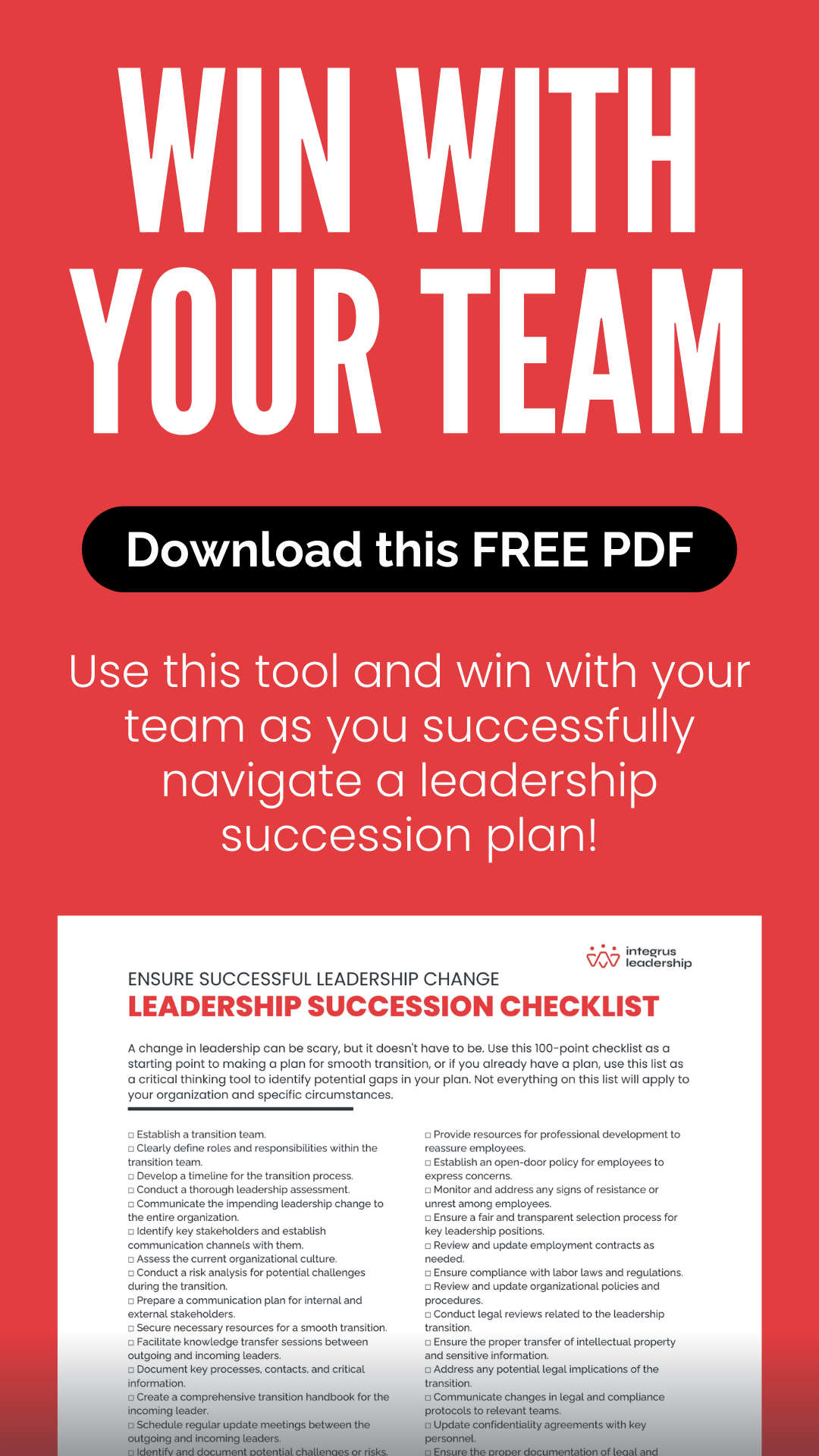info@integrus.org
Navigating Leadership Transition: 9 Steps to a Successful Succession

Lyle Wells
President

Brent Monogue
Director of Strategic Engagement

Nick Gardner
Executive Coach
Leadership Development Strategist
Introduction
Change is inevitable, yet succession planning often comes with extra challenges and uncertainties. Sometimes it can feel like the ship is going down in a storm of chaos, but it doesn't have to be that way.
Successfully navigating a leadership succession requires strategy and intentionality. Unfortunately, most organizations are not prepared for such transitions because they are caught off guard, or they've never been taught how to transition successfully. Either way, you don't have to stumble your way through the dark.
Here are nine crucial steps to ensure smooth transitions in leadership:
- Don't Rock the Boat: Embrace the Power of Listening
Transition is inherently unsettling, and the people you serve will likely fear change. Don't make radical changes in the first three months of succession. Instead, make active listening your top priority. Schedule one-on-ones with all your key leaders and invite their feedback. Genuinely hearing their concerns, gaps, and suggestions sets the tone for collaborative leadership. As Michael D. Abrashoff emphasizes in, It's Your Ship, "effective leaders prioritize understanding before implementing changes." - Address Clean Up: Make a Positive First Impression
First impressions matter, and as a new leader, prompt attention to areas left disorderly by previous leadership is crucial. Swiftly addressing and cleaning up these issues not only establishes your commitment to excellence but also earns trust with your team. Also, refrain from blaming or bashing the previous leadership, maintaining a focus on moving forward, appreciation, and honor. - Fresh Vision: Embrace the Call to Something New
God chose you for a reason, and that reason often involves bringing fresh vision. In months 3-5, cast new vision. Take intentional time away with your team to seek the Lord. Clarify where your organization is going, define its identity, and prioritize its goals. - Be Prepared for People to Get off the Bus: Normalizing Transition
Leadership changes inevitably lead to personnel changes. Expect and accept that some leaders may choose to leave within the first 3-5 months. This is a natural part of the transition process and should not be viewed as a reflection of your leadership capabilities. Normalize the idea that change is part of growth. - Pace Yourself: Set a Sustainable Leadership Rhythm
The first six months are a critical period, and the pace you set will define the new normal. Recognize that different teams may require different speeds. Prioritize playing the long game and avoid burnout. Rest, both for yourself and your team, is essential. As the leader, you have the power to set a sustainable pace for the whole team that fosters a healthy work environment and ensures everyone flourishes. - Lead in Your Flavor: Embrace Your Unique Leadership Style
God made only one of you. You are uniquely designed by God to lead in the season of transition; own it. And avoid trying to fit into a mold. Embrace and lead in your own flavor, even if it's different from previous leadership styles. Allow time for your team to adjust, understanding that diversity in leadership approaches can bring about positive change. - Have Fun: Inject Stability Through Enjoyment
Leadership transitions are inherently stressful, and stability is foundational to smooth succession. That's why you need to keep having fun as a team. The work ahead of your team is going to be challenging, but don't forget that fun, laughter, and a lighthearted approach won't undermine your authority; instead, it provides much-needed stability. Teams that have fun together weather storms together well too. - Embrace a New Identity: Navigate the Unfolding Transition
Many times in the Bible, God prepares a leader for a new identity with a name change. Think Abram to Abraham, Sarai to Sarah, Hadassah to Esther, and Saul to Paul. God might change your title, change your position, or re-organize your leadership structure during a succession, but remember, God is also changing you from the inside out. Embrace the change and the growth. Allow yourself to be shaped by the Holy Spirit. He's doing something new! - Seek Wise Counsel: Invite the Voices of Other Leaders
Change makes leaders focus inward on themselves and the organization but a crucial step in successful succession is seeking wise counsel. Find wise voices that will speak hard truths into your life and challenge you to see your decisions from a different point of view. Find a mentor outside of your organization or an executive coach. An experienced coach provides a safe space for leaders to share concerns, uncertainties, and aspirations.
How an Executive Coach Enhances Each Step:
- Listening and Understanding:
You're going to do a lot of listening in the early stages of succession. But you also need someone to listen to you. Someone whose only goal is your success. - Positive First Impressions:
You need someone to hold up a mirror and help you put your best foot forward. Test out the language you want to use to communicate change with an executive coach who can give you honest feedback so that you can make the best first impression possible. - Fresh Vision Creation:
God-given vision is contagious. An executive coach can help you process what you believe is the future of the organization while also helping you create measurable, practical next steps to see these dreams come to fruition. - Managing Personnel Changes:
Turnover in leadership can cause headaches and heartaches. Because at the end of the day, you need to build unity in your team. An executive coach can help you strategize the best ways to amplify the incredible leaders on your team and make pathways for underdeveloped leaders too. - Setting Sustainable Leadership Rhythms:
You're going to be tempted to overschedule and overcommit during succession. An executive coach will help you set realistic expectations of your time and keep you accountable to sustainable rhythms of work and rest. - Embracing Unique Leadership Styles:
Executive coaches empower leaders to embrace their unique leadership styles. Through self-discovery and feedback, leaders can confidently lead in their own flavor while fostering team cohesion.
Take Your Leadership to the Next Level
Schedule a Session with Brent
If you're currently in the middle of a leadership succession, or you know one is on the horizon, consider the transformative impact of adding an executive coach to your transition plan. Schedule a FREE 30-minute coaching session with Brent to explore your options and find out how executive coaching can help ensure a smooth transition.

















